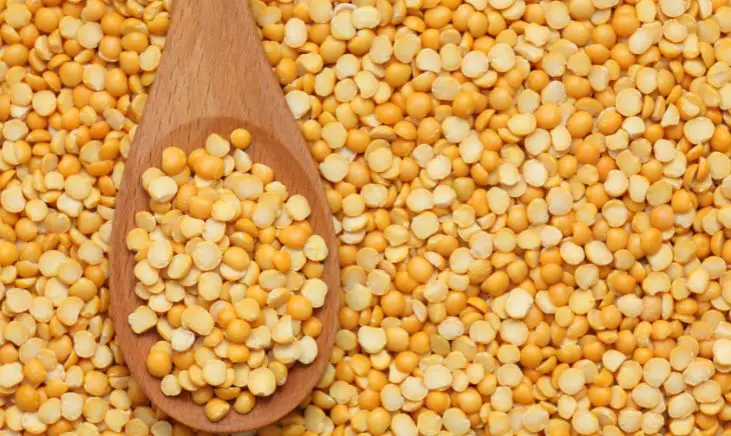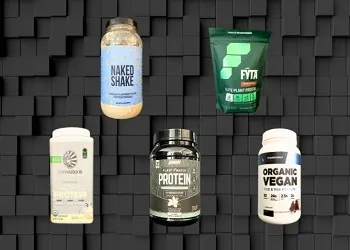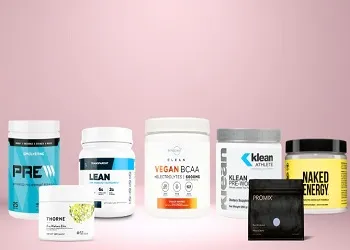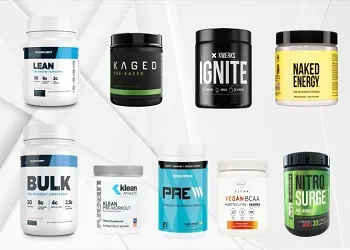Pea protein is just one type of protein powder supplement, but has become popular due to it being hypoallergenic and full of beneficial plant compounds. It’s also a fully plant-based source of protein that has similar benefits to using an animal product-based protein powder like whey.
For those who don’t get enough protein through diet, supplementing with protein can be an excellent way to build muscle, gain weight, or lose weight. As more of the population moves to natural, clean, organic and plant-based diets, more people are becoming curious about plant protein sources.
Table of Contents
Best Pea Protein Powders
If you’re on the hunt for the best pea protein powders to enhance your health, you’re in the right place. Below, I’ve listed my top picks of the best pea protein powders on the market. These picks are based on the type, ingredients (and lack thereof), and customer reviews.
It’s worth noting that some experts recommend combining rice and pea protein in a blend for a complete amino acid profile. We’ll delve deeper into this below.
Here are some of the best pea protein powders in 2023.
Best for Workout Recovery – Vega Sport Premium Plant-Based Protein Powder
This brand is an Amazon best seller, and it has an excellent ethos. For each product purchased, Vega plants a tree.
Highlights
- NSF certified
- 5 delectable flavors to choose from
- One serving contains:
- 30 g protein
- 2 g fiber
- 5 g BCAAs
- Added probiotics (2 million CFUs)
- Company values sustainability
Pricing
$64.79 (828 g)
$42.69 for 12 single packs
With added tart cherry extract and branched chain amino acids (BCAAs), this powder makes for an excellent base of a post-workout shake.
Best Single-Ingredient – Naked Pea
Naked Pea only contains pea protein isolate. This brand is very transparent in its ingredient list and main concern is providing simple, clean products.
Highlights
- Cost effective
- One serving contains:
- 27 g protein
Price
$57.99 (2.27 kg)
If you want a basic pea protein, this one will do the trick. However, due to it being a single-ingredient product, it is low in fiber and some essential amino acids. There is no indication of third-party testing procedures.
Best for Older Adults – Ritual Essential Daily Protein 50+
Ritual prides itself on traceability and responsibly sourcing ingredients.
Highlights
- One serving contains:
- 1.5 g HMB
- 370 mg calcium
- 20 g protein
- 3 g fiber
- 8 g EEAs
- 4 g BCAAs
- Informed Sport Certified
- Subtle vanilla flavor
- Uses regeneratively farmed peas
Price
$40 (482 g)
Calcium hydroxymethylbutyrate (HMB) has been shown to improve muscle maintenance, especially in older adults, making this powder a great option specifically for active adults aged 50 and over.
Best Meal Replacement – Form Peakblend – Vegan Meal Replacement
Form products have been featured in a number of high-profile publications and the company is a certified B-corporation.
Highlights
- One serving contains:
- 34 g protein
- 6 g fiber
- Digestive enzyme blend
- Omega-3 fatty acids
- Comes in a compostable pack
Price
$64 (1.3 kg)
This is a good product based on ingredients and brand ethos; however, the company does not outline any third-party procedures.
Best Organic Pea Protein Powders
Transparent Labs Organic Vegan Protein

This brand is known for using high-quality ingredients in clinically-backed doses. The blend of rice and pea protein makes for a complete amino acid profile in this vegan protein powder.
Highlights
- Informed Choice certified
- USDA organic
- Comes in french vanilla and chocolate
- 4.2/5 of 300+ reviews
- One serving contains:
- Rice protein and Pea protein isolate (24g total)
- Fats (2g)
- Sugars (2g)
- Carbs (3g, 2 of which sugar, 1g fiber)
- Sodium 260mg
- Iron (4mg)
- Potassium (5mg)
Price
$49.99 ($1.67/serving)
Transparent Labs is an industry favorite when it comes to workout supplements, and their vegan protein is no exception. It mixes well and tastes nice, offering a great alternative to whey or casein for vegans or those who are allergic to dairy products.
KOS Organic Plant Protein
KOS offers a variety of organic products. The plant protein powder contains an abundance of added vitamins and minerals from whole-food sources.
Highlights
- Can select unflavored or choose from six different flavors
- Several customers commented on its delicious taste and smooth texture
- USDA Organic
- GMP certified
- One serving contains:
- 20 grams of protein
- 3 grams of fiber
- Added vitamins and minerals
Price
$50 (1 kg)
This powder may be an excellent option for kids or picky eaters that struggle to get enough plant compounds or protein in their diet.
Garden of Life Raw Organic Protein Powder
Garden of Life is a reputable brand in the supplement space; it is also a registered B-corporation that focuses on giving back.
Highlights
- One serving contains:
- 22 g protein
- 4 g BCAAs
- 1 g fiber
- Probiotics and digestive enzymes
- NSF certified
- USDA organic
- Unflavored
Price
$40–$50 (560 g)
This organic pea protein powder is clean, unflavored, and has multiple certifications. You can’t go wrong with this one if you are after a natural protein supplement.
Honorary Mention – Anthony’s Premium Pea Protein Powder
This single-ingredient organic pea protein is super popular and cost effective. However, I’m only giving it an honorary mention as it is not certified or third-party tested.
What is Pea Protein Powder?
You guessed it, pea protein does in fact come from peas. But they aren’t your regular old garden peas you may buy in the supermarket. The peas used for protein powder in the U.S. are yellow and green split peas.
After harvest, the peas are dried, ground, mixed with water, and formed into a paste. This paste is then dried where the end result is powder, which is what we purchase.
Peas are used as a vegan protein source due to the legumin and vicilin content. These are great sources of protein storage.
Ingredients
Of course, the exact ingredients in pea protein powders will vary by brand. Since the typical target buying audience for plant protein are vegans and health-conscious individuals, many brands offer single-ingredient powders, with the only item on the list being peas.
Like any powdered supplement, some brands choose to create blends by adding other substances and compounds with beneficial properties like probiotics, nootropics, and digestive enzymes.
Amino Acid Profile
The amino acid profile of plant proteins are not the same as animal proteins. This isn’t necessarily a bad thing, but it is something to be aware of. This is why some companies use vegan protein blends, and not single-ingredient options, to ensure consumers are getting enough of all nine essential amino acids (EAAs) from supplementation.
Most, but not all, animal foods are complete proteins. This means that they contain all nine EEAs. These are called essential because we must obtain them from food or supplements because our body doesn’t make them like it does non-essential amino acids.
Branched chain amino acids (BCAAs) are a subset of EAAs, which include leucine, isoleucine, and valine. Leucine is the main amino acid that activates muscle protein synthesis (MPS), so it’s important to look for a BCAA ratio of 2:1:1 of the three EEAs mentioned above, if your primary concern is building muscle.
Pea protein is technically a complete protein, but it contains a very low amount of the EAA methionine. Peas are quite low in methionine, but are high in lysine. On the other hand, rice protein is high in methionine and low in lysine. So, this is why we see brands blending plant protein sources. This is also why nutrition experts recommend eating complementary proteins to people, especially to those on a primarily plant-based diet. A prime example of two complementary proteins are beans and rice.
All of this is important if you are consuming protein powders to help you build lean muscle, because muscle protein synthesis (MPS) requires all amino acids to be present to build muscle.
Benefits of Pea Protein
A Key Nutrient Source
Pea protein is an excellent source of nutrients like iron and fiber compared to other protein powders. This is a significant factor since the majority of the population living in Western nations do not consume enough dietary fiber and iron deficiency is a growing problem.
Hypoallergenic
Pea protein is also hypoallergenic because it doesn’t contain any of the major food allergens which are milk, eggs, fish, crustacean shellfish, tree nuts, peanuts, wheat, and soybeans.This is potentially great news for anyone who struggles to find foods and supplements that don’t trigger allergies or sensitivities.
Enhances Muscle Growth
It’s no secret that protein is integral to building muscle and attenuating delayed muscle soreness (DOMS) to support adequate muscle recovery. Since pea protein is a relatively novel plant protein source, more research has been conducted with whey. However, research has found similar results comparing pea protein to whey and fitness outcomes like muscle thickness and strength.
Assists Weight Control
In general, protein can help with weight loss because of the satiety effect of protein — meaning it helps you feel full. Those looking to cut calories typically choose a pea protein isolate to just consume protein and nothing else.
If weight loss is the goal, you may consider meal replacement smoothies that utilize pea protein. A pea protein concentrate will be suited to meal replacement shakes because these will have more calories in addition to carbohydrates and fats, which are integral components of a meal.
On the flip side, someone looking to gain weight may want to use a concentrate for the additional calories and carbohydrates. It wouldn’t necessarily be used as a meal replacement.
Improves Heart Health
Compounds called isoflavones that are present in legumes like peas are thought to provide protection against age-related decline and conditions like heart disease. Other research has illuminated the anti-inflammatory effects of pea compounds.
How to Use Pea Protein Powder

Recommended Intake
You should look for supplements that contain between 20 and 30 grams of protein per serving. The optimal amount of protein for muscle growth is between 1.4–2.0 grams per kilogram of body weight daily, as recommended by the International Society of Sports Nutrition (ISSN). This figure includes protein from foods and powders.
It is crucial to avoid surpassing 2.3 grams per pound (5 grams per kg) of body weight per day or exceeding 35% of your calorie intake from protein. This is because excessively high protein intake can overwhelm the liver’s ability to metabolize it efficiently, resulting in adverse effects such as elevated levels of ammonia in the bloodstream, feelings of nausea, digestive issues like diarrhea, and potentially fatal consequences.
Pea protein powders can be used in all the same ways as whey protein powder can. The most common way to consume protein powder is in a smoothie or shake. There are countless recipes that utilize protein powders in smoothies. For times when a blender isn’t accessible, a blender bottle can be used for pea protein and your favorite plant milk or water.
If you’re looking for more creative ways to use pea protein powder in your diet, there are a myriad of recipes online just waiting to be tested. Some of my personal favorites are protein pancakes, protein energy balls, and blueberry muffins made with protein powder.
Side Effects of Pea Protein Powder
There aren’t many side effects to using pea protein powder, especially if you choose a single-ingredient product. However, some people can experience bloating and gas from protein supplements, and pea protein is no different.
Pea Protein Vs. Whey
Whey and pea protein are two popular types of protein powders on the consumer market. Both whey and pea protein powders are excellent sources of dietary protein. Deciding between whey and pea protein will ultimately come down to your personal preferences, sensitivities or allergies, and goals.
Whey protein is by far the most popular and well-studied protein supplement on the market. Since it is made from milk, whey has more calcium and potassium than pea protein, but it also has more cholesterol.
Pea protein is a plant-based alternative that has garnered fame due to more of the population following a vegan diet. It contains more fiber and iron than whey. Pea protein may have additional plant compounds with added health benefits, but there isn’t sound evidence yet to be sure.
Both whey protein and pea protein have been shown to effectively enhance muscle growth. Additionally, both may or may not be effective at facilitating weight loss. There is a need for more research comparing the outcomes of whey protein use versus using pea protein for muscle gain or weight loss.
Since pea protein is vegan, it has a lower environmental impact compared to whey. Animal-based food products tend to require more natural resources and cause greater environmental strain. Generally speaking, pea protein may be more expensive and harder to find compared to whey since it is more of a specialty product.
Whey and pea protein both serve the same purpose, but there are a few factors worth considering if you are thinking of implementing one of the two into your diet.
How to Select the Best Pea Protein Powders
Types
There are a few different types of pea protein, including isolate, concentrate, and blended versions. There are only slight differences in these types, and what you choose will likely come down to your personal preference and goals. For example, if weight loss is the goal, isolate is the best choice whereas concentrate is best for weight gain.
Pea protein isolate only contains pea protein and amino acids. Concentrate contains less protein than isolate but has additional nutrients such as carbohydrates and fats. For this reason, concentrate would be a better supplement to use as a meal replacement. Some pea protein powders are blended with other plant proteins like rice protein.
Pea protein and pea protein isolate aren’t exactly the same thing, but they are sometimes used interchangeably. Pea protein powder is essentially an umbrella term for the three main types of powdered pea protein supplements you will see in stores and online.
Ingredients
It’s important to know what items on an ingredient list may raise red flags. Things like added sugars, stabilizers, and fillers may come with side effects or long-term health effects that you should avoid if possible.
Some key ingredients to avoid in pea protein powder supplements are:
- Gluten
- Dextrin and glucose
- Artificial sweeteners
- Soy
- Vegetable oils and fats
- Thickeners and gums
- Fillers
There are some exceptions, but regardless, a good rule of thumb to follow is the fewer ingredients, the better!
Certifications
In the United States, foods and medicines are regulated by the Food and Drug Administration (FDA). Supplements don’t fall under either of these categories, so supplement manufacturers are not required to go through rigorous clinical trials and third-party ingredient testing before formulating a product. This is why regulatory bodies exist for supplements, so consumers can rest assured knowing there are standards in place for supplements.
Some certifications to be on the lookout for are:
- NSF Certified for Sport
- US Pharmacopeia (USP)
- Good Manufacturing Practices (GMP) or Current Good Manufacturing Practices (CGMP)
Final Thoughts
Pea protein is an excellent choice for a vegan protein powder. It has an ideal nutrient profile, is hypoallergenic and easy to digest, helps build muscle, improves heart health, and can be used to assist in weight gain or weight loss. Pea protein powder doesn’t come with many side effects besides potential gas and bloating as long as users only consume the recommended amount.
If muscle building is your primary goal, you may want to combine plant protein sources to ensure an adequate amino acid profile. Whey and pea protein have been found to have similar benefits, but pea protein is more sustainable but likely harder to find and pricier.
As always, the best way to achieve a healthy diet is through a well-rounded whole food diet. If you feel as though you want more information or tailored nutrition and fitness advice, consider booking a consultation with an expert at EverFlex.
FAQ
Is it safe to drink pea protein everyday?
Yes, it is safe to drink pea protein every day if you’re only consuming the recommended amount.
Is pea protein actually good for you?
Pea protein is considered a healthy plant protein source. It is rich in iron, fiber, and essential amino acids that help maintain muscle growth and body functions.
How do I choose pea protein powder?
There are a few factors to consider when choosing a pea protein supplement. You will want to understand the ingredient list by choosing to consume only the necessary ingredients, decide on a concentrate, isolate, or blend.
References
Babault, N., Païzis, C., Deley, G., Guérin-Deremaux, L., Saniez, M.-H., Lefranc-Millot, C., & Allaert, F. A. (2015). Pea proteins oral supplementation promotes muscle thickness gains during resistance training: a double-blind, randomized, Placebo-controlled clinical trial vs. Whey protein. Journal of the International Society of Sports Nutrition, 12(1), 3. https://doi.org/10.1186/s12970-014-0064-5
Banaszek, A., Townsend, J., Bender, D., Vantrease, W., Marshall, A., & Johnson, K. (2019). The Effects of Whey vs. Pea Protein on Physical Adaptations Following 8-Weeks of High-Intensity Functional Training (HIFT): A Pilot Study. Sports, 7(1), 12. https://doi.org/10.3390/sports7010012
Carbonaro, M., & Nucara, A. (2022). Legume Proteins and Peptides as Compounds in Nutraceuticals: A Structural Basis for Dietary Health Effects. Nutrients, 14(6), 1188. https://doi.org/10.3390/nu14061188
Jäger, R., Kerksick, C. M., Campbell, B. I., Cribb, P. J., Wells, S. D., Skwiat, T. M., Purpura, M., Ziegenfuss, T. N., Ferrando, A. A., Arent, S. M., Smith-Ryan, A. E., Stout, J. R., Arciero, P. J., Ormsbee, M. J., Taylor, L. W., Wilborn, C. D., Kalman, D. S., Kreider, R. B., Willoughby, D. S., & Hoffman, J. R. (2017). International Society of Sports Nutrition Position Stand: protein and exercise. Journal of the International Society of Sports Nutrition, 14(1). https://doi.org/10.1186/s12970-017-0177-8
Le, C. H. H. (2016). The Prevalence of Anemia and Moderate-Severe Anemia in the US Population (NHANES 2003-2012). PLOS ONE, 11(11), e0166635. https://doi.org/10.1371/journal.pone.0166635
Morton, R. W., Murphy, K. T., McKellar, S. R., Schoenfeld, B. J., Henselmans, M., Helms, E., Aragon, A. A., Devries, M. C., Banfield, L., Krieger, J. W., & Phillips, S. M. (2017). A systematic review, meta-analysis and meta-regression of the effect of protein supplementation on resistance training-induced gains in muscle mass and strength in healthy adults. British Journal of Sports Medicine, 52(6), 376–384. https://doi.org/10.1136/bjsports-2017-097608
Ndiaye, F., Vuong, T., Duarte, J., Aluko, R. E., & Matar, C. (2011). Anti-oxidant, anti-inflammatory and immunomodulating properties of an enzymatic protein hydrolysate from yellow field pea seeds. European Journal of Nutrition, 51(1), 29–37. https://doi.org/10.1007/s00394-011-0186-3
Nieman, D. C., Zwetsloot, K. A., Simonson, A. J., Hoyle, A. T., Wang, X., Nelson, H. K., Lefranc-Millot, C., & Guérin-Deremaux, L. (2020). Effects of Whey and Pea Protein Supplementation on Post-Eccentric Exercise Muscle Damage: A Randomized Trial. Nutrients, 12(8), 2382. https://doi.org/10.3390/nu12082382
Nutrition, C. for F. S. and A. (2023). Food Allergies: What You Need to Know. FDA. https://www.fda.gov/food/buy-store-serve-safe-food/food-allergies-what-you-need-know#:~:text=What%20Are%20Major%20Food%20Allergens
Wong, M. C. Y., Emery, P. W., Preedy, V. R., & Wiseman, H. (2008). Health benefits of isoflavones in functional foods? Proteomic and metabonomic advances. Inflammopharmacology, 16(5), 235–239. https://doi.org/10.1007/s10787-008-8023-x














